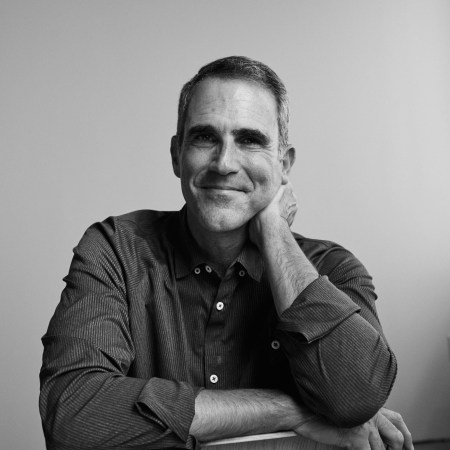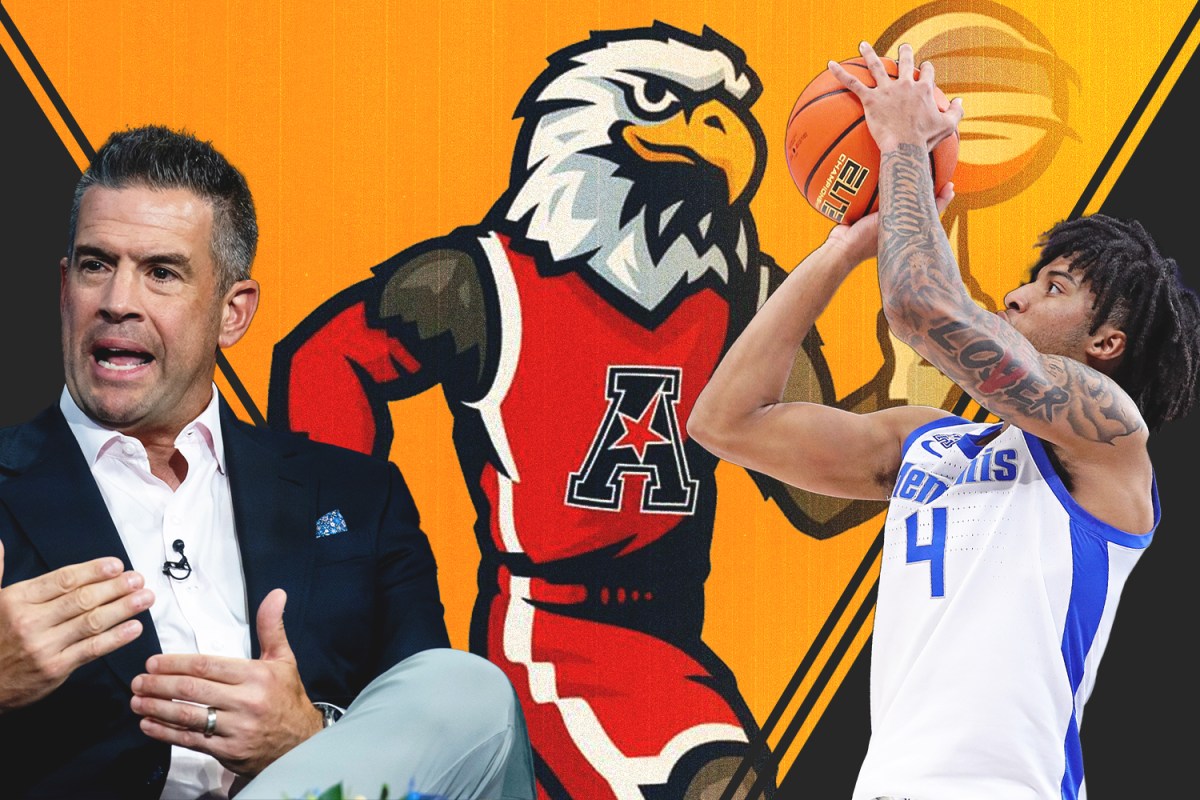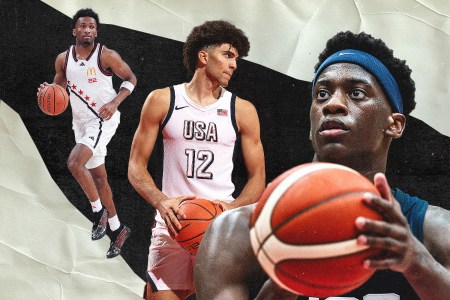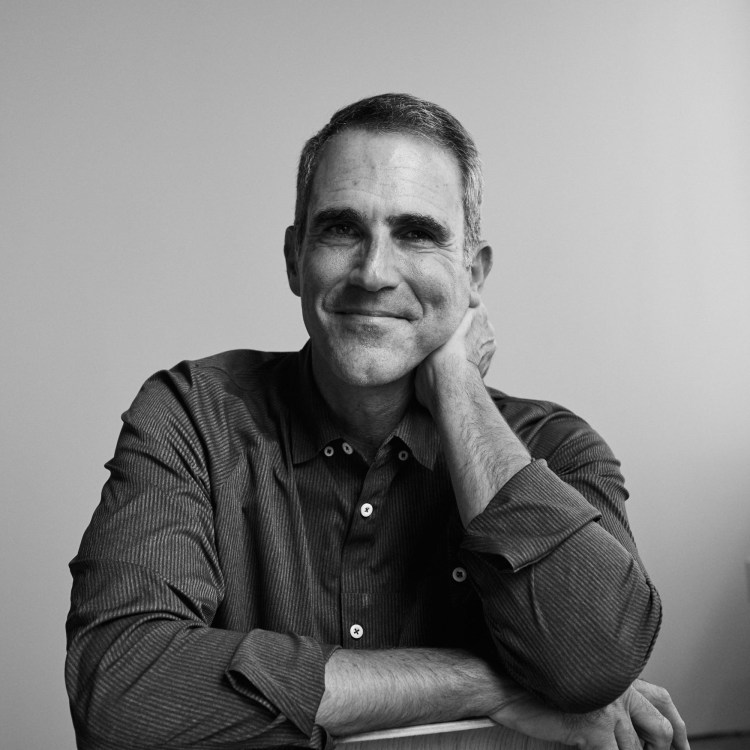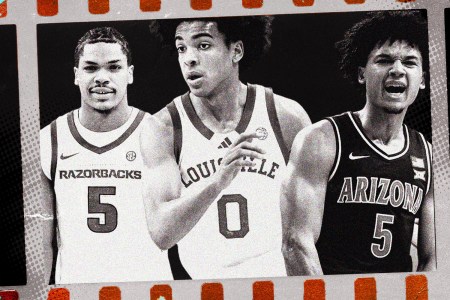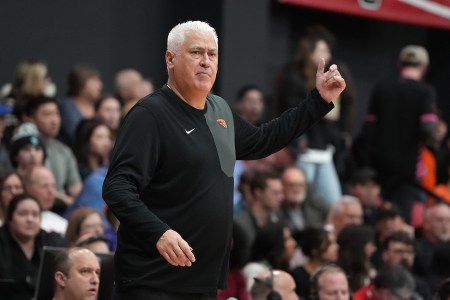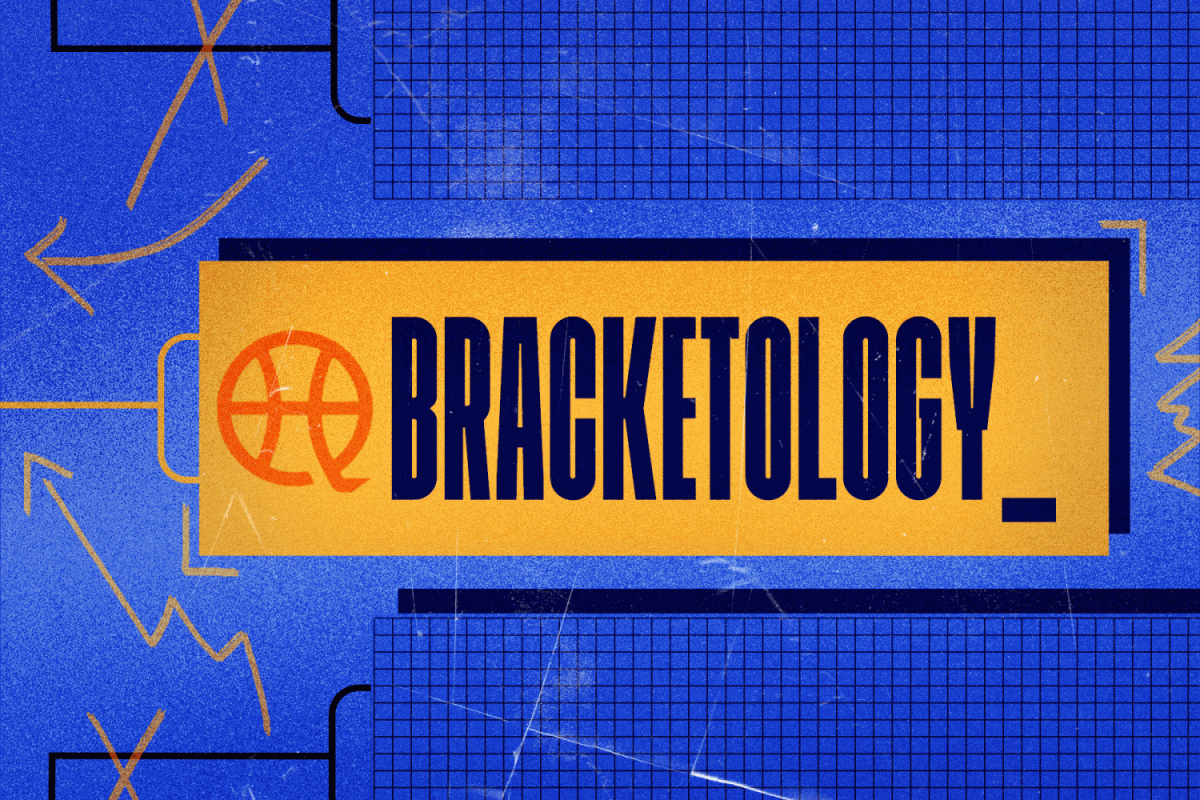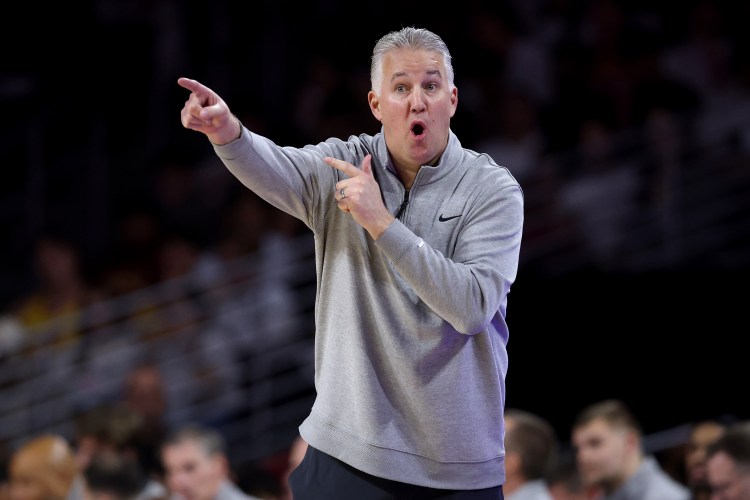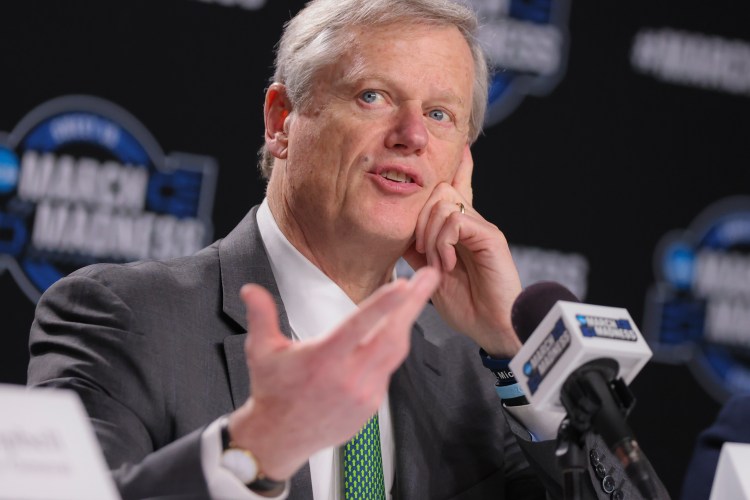Monday’s announcement that the American Athletic Conference was rebranding itself as the American Conference was more than a year in the making. From the moment Tim Pernetti took over as commissioner on June 1, 2024, he has focused intensely on the need for the league to reinvent itself. Along with tweaking the name, the American introduced a new logo, tag line (“Built to Rise”), three-pronged ethos (Innovation, Grit, Service) and brand ambassador, Soar the Eagle, so chosen because it is a quintessentially American symbol.
Commissioner plans, God laughs. Within hours of the big reveal, Yahoo! Sports reported that Memphis, the American’s pre-eminent basketball program, has been working for months to join the Big 12. Memphis reportedly offered the league more than $200 million in entry fees, but so far the Big 12 appears uninterested. The revelation that Memphis was willing to pay huge money to exit the league and still got rejected undercut the lofty message of the rebrand, to say the least. It also underscored that for all their efforts, Pernetti and his colleagues face a steep climb and an uncertain future.
Chaos! Confusion! Conflict! The New Era in College Sports Is Off to a Rocky Start
The approval of the settlement in House v. NCAA was supposed to usher in a new era of clarity, but that is a long way off
In an exclusive interview with Hoops HQ on Tuesday, Pernetti, 54, acknowledged that he would have preferred that the Memphis revelation didn’t come on the same day as the rebrand announcement, but he added that he was well-aware of the conversations between the school and the Big 12, and that he doesn’t begrudge anyone’s desire to explore all possible options. “I was in the throes of it when I was an athletic director (at Rutgers), and I understand your job is always to do what’s best for your school,” Pernetti said. “It’s actually a compliment when these things happen. But there are certain things I control and certain things I don’t control. I’m spending 150 percent of my time on trying to make this conference a place where not only people want to stay, but people want to come.”
There is much irony to all of this given that Pernetti had a strong hand in unleashing the realignment monster that devoured this once-formidable league. As the athletic director at Rutgers, his alma mater, Pernetti engineered that school’s decision in November 2012 to leave the Big East for the Big Ten. Coming one day after Maryland’s decision to leave the ACC for the Big Ten, Rutgers’ move was a huge domino in the expansion roulette. The Big East had already been jolted by the defections of Pittsburgh, Syracuse, TCU and West Virginia. As a result, the Big East basketball schools, the so-called “Catholic Seven”, broke away and formed their own league, retaining the Big East name. The remaining schools were left to create their own league, which they called the American Athletic Conference.
Rutgers faced a two-year transition period before officially joining the Big Ten. It spent the second of those years in the inaugural version of the AAC. It left the following year, as did Louisville, which went to the ACC. Realignment simmered for a while, but when it flared up in the summer of 2022, the AAC was raided like a neighborhood store in bankruptcy. UConn went to the Big East; Cincinnati, Houston and UCF went to the Big 12; and last year SMU joined the ACC. By the time Pernetti took over for the retiring Mike Aresco last summer, the AAC was in tatters.

Rebuilding the American is a tall task, but Pernetti has the pedigree to take the leap. After playing tight end at Rutgers from 1989-93, he went on to have an accomplished and versatile career as a media mogul (executive vice president at CBS College Sports) and marketing agent (EVP at Endeavor). He also has experience as a team executive, having overseen the launch of the expansion New York City Football Club for Major League Soccer in 2015 as the team’s Chief Business Officer.
Pernetti was serving as the president of IMG Academy in Bradenton, Fla., when he was approached by the AAC. He was not looking to make a move, but the more he dug into the situation, the more it appealed to him. “This was a group of presidents that were excited about the idea of taking risks,” he said. “I never expected to have the opportunity to do something like this in my career, but I felt like it came at the right time. I understood this was an industry in a dangerous period of transformation. My experiences as a student-athlete were incredibly meaningful to me. Had I not played college football, I think I’d be a different person. I thought it was a great opportunity to get in on a brand that is ready to do things differently.”
As part of his due diligence, Pernetti Googled “AAC” and saw that it repopulated to “ACC.” Said Pernetti, “I remember filing it away, thinking, all right, that’s a problem.” That planted the idea of a rebrand in his head. As soon as he settled into the job, he started engaging hundreds of personnel from all around the league to formulate ideas. He used Anachel, a branding, communications and marketing company, to assist in that effort, but Pernetti had a clear idea of the direction he wanted the league to take.
Though the American wasn’t a defendant in the House v. NCAA case, all of its schools have opted into the settlement, which means they can share up to $20.5 million in revenue with their athletes. That is a maximum, not a minimum, so Pernetti implemented a minimum investment threshold that all schools must clear. The American is believed to be the only league to have such a standard. Pernetti also launched a league-owned commercial division in an effort to squeeze every possible dollar out of the marketplace.
For many years, Aresco tried to convince people to characterize the AAC as a power conference in men’s basketball. There was some merit to that argument for a while, but the mass exodus relegated the American to a clear mid-major, and a less-than-elite one at that. Last season, the AAC was No. 11 in KenPom’s rankings, behind the Mountain West, WCC, Atlantic-10, Conference USA and Missouri Valley. It did not garner any at-large bids to the NCAA Tournament.
Top 10 Freshmen for the 2025-26 Men’s Hoops Season
Last year’s freshman class was special and owned the NBA lottery. Led by AJ Dybantsa, Darryn Peterson and Cameron Boozer, this year’s class could be even better.
Improving the league’s basketball profile is at the top of Pernetti’s agenda. The number one message he has conveyed is the need for stronger non-conference schedules, although that is getting harder to do given the reluctance of power conference schools to risk losing those games. The policy is especially critical with respect to the league’s lesser programs. “Improving as a basketball league is largely about bringing the bottom up,” he said. “We’ve been very transparent that that’s what this whole exercise is about. Coaches and administrators have heard us loud and clear.”
Pernetti is also looking for ways to build a stronger conference schedule. He points out that last season, the league’s two top teams, Memphis and North Texas, only played once. “That can’t happen,” he said. He is talking with the league’s TV partners about using flexible scheduling to ensure that the American’s best games fit into their primary windows. Last month, Pernetti hired former Big East commissioner Mike Tranghese as a consultant. “Mike has been an incredible asset, mainly because of his ideas, but also because of who he is and the credibility he brings to the table,” Pernetti said.
The American added six teams to replace the schools who left, and while they represented a downgrade from the defectors, it does leave the league with a healthy roster of 13 schools. Pernetti said he is open to the idea of adding more, but he won’t expand for expansion’s sake. “I don’t want put the league in position to be diluted financially,” he said. “If we expand, we will be diligent about making sure it brings incremental value to the league.”
The road ahead may be uncertain, but Pernetti remains unbowed and undeterred in his efforts to help the AAC – sorry, the American – rise anew. “I think we’re in a sweet spot,” Pernetti said. “I don’t have any illusions that we look like an autonomy conference, but I also don’t believe that we look like anybody else. We’re constantly thinking about modernization and the big picture. I’m excited about where we are.”
